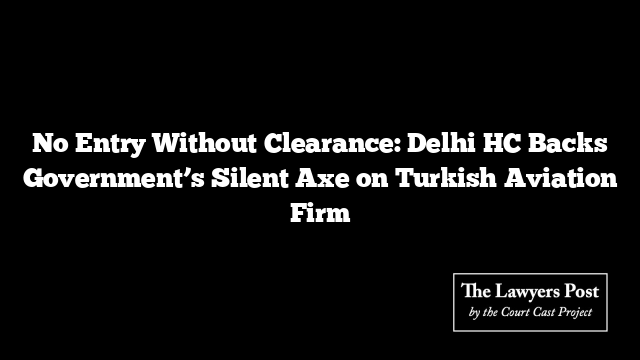In a ruling that drew a sharp line between sovereignty and due process, the Delhi High Court declared that when national security is on the line, procedural fairness must step aside.
The judgment came in a case filed by the Indian wing of Turkish aviation company Çelebi, which had its security clearance abruptly yanked by the Ministry of Civil Aviation on May 15, 2025. The company wasn’t given notice, wasn’t given a hearing—and according to the Court, wasn’t entitled to either.
Justice Sachin Datta, steering the bench, ruled that the veil of national security cannot be pierced by demands for transparency or pre-hearing rights. “Security of the realm,” the Court said, “is the pre-condition for enjoyment of all other rights.”
The spark behind this legal standoff? A four-day military standoff between India and Pakistan. Turkey, during that brief but charged conflict, was vocal in its support for Islamabad. Shortly after, Çelebi—a Turkish-owned company embedded in key Indian airports—found itself unwelcome in Indian aviation circles.
Delhi International Airport Limited (DIAL) followed suit by terminating its contracts with Çelebi. Within days, the company—operating cargo and ground services at airports in Delhi, Hyderabad, Goa, Bengaluru, and Kochi—ran to the High Court, alleging arbitrary treatment, lack of hearing, and risk to investor confidence and thousands of Indian jobs.
The company’s core argument: while Turkish in ownership, its Indian operations were run by locals with a clean, decade-long record. It cried foul over the lack of pre-decisional hearing under Rule 12 of the Aircraft (Security) Rules, 2023.
The Court, however, was unmoved. Relying on a prior Supreme Court decision, Ex-Armymen’s Protection Services v. Union of India, Justice Datta reiterated that judicial review bows before classified intel. When it comes to what constitutes a threat to national security, courts will not second-guess the government.
Classified material was presented in sealed covers. After review, the Court found “compelling” reasons, including the specter of espionage and dual-use logistics, especially concerning Çelebi’s privileged access to airside operations—aircraft, cargo holds, and security zones.
The judgment leaned heavily on Section 6 of the Bharatiya Vayuyan Adhiniyam, 2024 and Section 5A(1A) of the Aircraft Act, 1934. It also invoked India’s obligations under Annexure 17 of the ICAO Convention, emphasizing secure access protocols and background checks.
Any reading of Rule 12 to insist on pre-hearing in such cases, the Court said, would “frustrate the very objective” of swift national security action.
Çelebi’s twin petitions—filed by its airport services and cargo arms—were dismissed. So was the hope of legal intervention in such tightly controlled terrain.
On the sidelines, Indothai, a domestic operator, has already stepped in to handle ground services at affected airports. Çelebi, however, isn’t retreating quietly—it has now taken the fight to the Bombay High Court as well. But in Delhi, the message was clear: when the state pulls the plug in the name of national security, the lights go out without warning.





